Herbert H. Carnegie was a hockey player and philanthropist. Perhaps The Canadian
Encyclopedia put it best: “Arguably the first Black Canadian hockey star, Herb Carnegie is
widely regarded as the best Black player never to play in the National Hockey League (NHL).”
Born in Toronto, Carnegie was one of seven children whose parents were immigrants from
Jamaica. As a child, he played softball, golf and hockey, but hockey was his first love. Both he
and his older brother Ossie hoped to become professional hockey players.
In the 1930s, Carnegie played in several Toronto-area amateur leagues, proving himself to be an
exceptional player. In 1938, Carnegie was on the Toronto Young Rangers Junior A team, when
Toronto Maple Leafs boss Conn Smythe noticed him. Smythe publicly stated he would hire
Carnegie in a heartbeat if only he could “turn him white” – a racist remark that Carnegie later
said “shattered” him, but did not diminish his love for hockey.
From 1940 to 1942, Carnegie played across Northern Ontario with the Timmins Buffalo
Ankerites. In 1941, the Ankerites became the first semi-professional organization to feature an
all-Black line, made up of Carnegie, his brother Ossie, and Vincent Churchill “Manny”
McIntyre. They helped the team win two championships.
In 1944, Carnegie joined the Quebec Provincial Hockey League, launching his semi-professional
career, playing for one season. The next season, Carnegie drew the interest of NHL talent scouts,
and in 1948, the New York Rangers invited him to their training camp. But he was not selected
for the team. He returned to Sherbrooke for the 1948–49 season.
In 1949–50, Carnegie transferred to the Quebec Aces in Quebec City, where he played for four
seasons. In the 1950–51 season, Carnegie played alongside future hockey great Jean Béliveau. In
his last season, Carnegie skated for the Owen Sound Mercurys. He retired from hockey in 1954
at age 34.
Carnegie firmly believed that racism is what kept him from achieving his dream of playing in the
NHL. In his memoir, he wrote of racist slurs from fans and coaches, hurled at him and other
Black players. In a 2009 CBC interview, Carnegie wept as he recalled the deeply painful impacts
of the racism he and other experienced.
Carnegie then had a long career in investment and enjoyed golf in his spare time, winning
several local and national championships. In 1955, Carnegie founded the Future Aces Hockey
School, the first registered hockey school in Canada. In 1987, he established the
Herbert H. Carnegie Future Aces Foundation, which has funded more than $630,000 in
scholarships.
Carnegie has been honoured in many ways. For example: Canada’s Sports Hall of Fame (2001);
Ontario Sports Hall of Fame (2014); Owen Sound Sports Hall of Fame (1997); International
Afro-American Sports Hall of Fame and Gallery (1997); Senior Hockey Hall of Fame Immortal
(2004); Black Hockey and Sports Hall of Fame (2006); African American Ethnic Sports Hall of
Fame (2007); and in 2022, Hockey Hall of Fame, Builder category.
Carnegie also received other honours: the Order of Ontario (1996); the Order of Canada (2003);
the Queen’s Silver Jubilee Medal (1977); the Queen’s Golden Jubilee Medal (2002); and the
Diamond Jubilee Medal (2012; posthumous). He received: the Ontario Medal for Good
Citizenship (1988); City of North York Volunteer of the Year (1989); Volunteer Award of
Distinction (1997); Apple Creek SDA Role Model Award (2009); the Planet Africa Lifetime
Achievement Award (2007), and many other recognitions.
In June 2006, Carnegie received an Honorary Doctor of Laws degree from York University.
A public School in Toronto is named in his honour. And in 2001, the hockey arena in
North York was renamed the Herbert H. Carnegie Centennial Centre.
(Sources: The Canadian Encyclopedia, Wikipedia)
Photo credit: Multicultural History Society of Ontario,
Black Canadian Collection, ca. 1949-1953, BLA-200511


Recent Comments